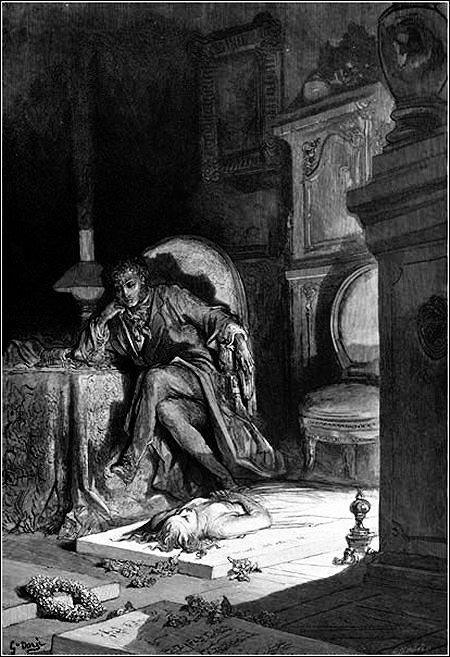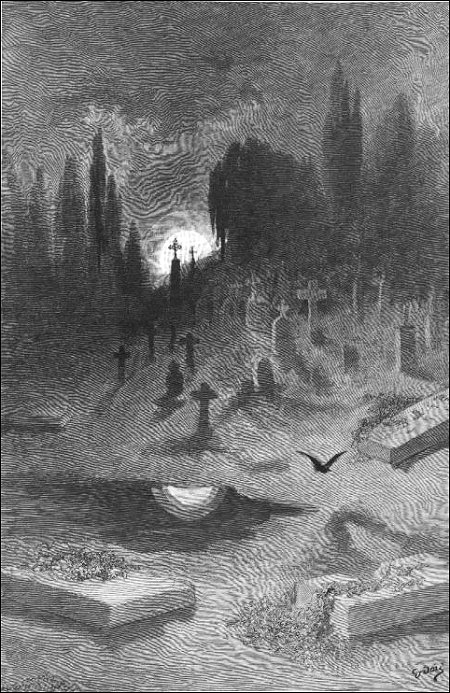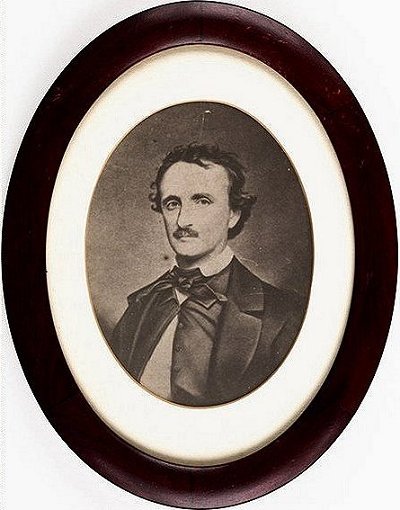Edgar Allan Poe: Six Poems
.jpg)
E D G A R A L L A N P O E
(1809-1849)
Six Poems
The Assignation
Thou wast all that to me, love,
For which my soul did pine-
A green isle in the sea, love,
A fountain and a shrine,
All wreathed with fairy fruits and flowers,
And all the flowers were mine.
Ah, dream too bright to last!
Ah, starry Hope! that didst arise
But to be overcast!
A voice from out the Future cries,
"Onward!"- but o’er the Past
(Dim gulf!) my spirit hovering lies
Mute, motionless, aghast!
For, alas! alas! with me
The light of life is o’er!
"No more– no more– no more,"
(Such language holds the solemn sea
To the sands upon the shore)
Shall bloom the thunder-blasted tree
Or the stricken eagle soar!
And all my hours are trances,
And all my nightly dreams
Are where thy dark eye glances,
And where thy footstep gleams-
In what ethereal dances,
By what Italian streams.
Alas! for that accursed time
They bore thee o’er the billow,
From Love to titled age and crime,
And an unholy pillow!–
From me, and from our misty clime,
Where weeps the silver willow!

Alone
From childhood’s hour I have not been
As others were; I have not seen
As others saw; I could not bring
My passions from a common spring.
From the same source I have not taken
My sorrow; I could not awaken
My heart to joy at the same tone;
And all I loved, I loved alone.
Then- in my childhood, in the dawn
Of a most stormy life- was drawn
From every depth of good and ill
The mystery which binds me still:
From the torrent, or the fountain,
From the red cliff of the mountain,
From the sun that round me rolled
In its autumn tint of gold,
From the lightning in the sky
As it passed me flying by,
From the thunder and the storm,
And the cloud that took the form
(When the rest of Heaven was blue)
Of a demon in my view.

The Haunted Palace
In the greenest of our valleys
By good angels tenanted,
Once a fair and stately palace —
Snow-white palace — reared its head.
In the monarch thought’s dominion —
It stood there!
Never Seraph spread his pinion
Over fabric half so fair.
Banners yellow, glorious, golden,
On its roof did float and flow —
This — all this — was in the olden
Time long ago —
And every gentle air that dallied,
In that sweet day,
Along the rampart plumed and pallid,
A winged odour went away.
All wanderers in that happy valley,
Through two luminous windows saw
Spirits moving musically
To a lute’s well tuned law,
Round about a throne where sitting
(Porphyrogene!)
In state his glory well befitting,
The sovereign of the realm was seen.
And all with pearl and ruby glowing
Was the fair palace door ;
Through which came flowing, flowing, flowing,
And sparkling evermore,
A troop of echoes, whose sweet duty
Was but to sing
In voices of surpassing beauty,
The wit and wisdom of their king.
But evil things in robes of sorrow,
Assailed the monarch’s high estate!
Ah, let us mourn — for never morrow
Shall dawn upon him desolate!
And round about his home the glory,
That blushed and bloomed,
Is but a dim-remembered story
Of the old time entombed.
And travellers now within that valley,
Through the red-litten windows, see
Vast forms that move fantastically
To a discordant melody;
While, like a rapid ghastly river,
Through the pale door;
A hideous throng rush out forever,
And laugh — but smile no more.

The Valley of Unrest
Once it smiled a silent dell
Where the people did not dwell;
They had gone unto the wars,
Trusting to the mild-eyed stars,
Nightly, from their azure towers,
To keep watch above the flowers,
In the midst of which all day
The red sunlight lazily lay.
Now each visitor shall confess
The sad valley’s restlessness.
Nothing there is motionless-
Nothing save the airs that brood
Over the magic solitude.
Ah, by no wind are stirred those trees
That palpitate like the chill seas
Around the misty Hebrides!
Ah, by no wind those clouds are driven
That rustle through the unquiet Heaven
Uneasily, from morn till even,
Over the violets there that lie
In myriad types of the human eye-
Over the lilies there that wave
And weep above a nameless grave!
They wave: — from out their fragrant tops
Eternal dews come down in drops.
They weep: — from off their delicate stems
Perennial tears descend in gems.

The Valley Nis
Far away — far away —
Far away — as far at least
Lies that valley as the day
Down within the golden east —
All things lovely — are not they
Far away — far away ?
It is called the valley Nis.
And a Syriac tale there is
Thereabout which Time hath said
Shall not be interpreted.
Something about Satan’s dart —
Something about angel wings —
Much about a broken heart —
All about unhappy things:
But "the valley Nis" at best
Means "the valley of unrest."
Once it smil’d a silent dell
Where the people did not dwell,
Having gone unto the wars —
And the sly, mysterious stars,
With a visage full of meaning,
O’er the unguarded flowers were leaning:
Or the sun ray dripp’d all red
Thro’ the tulips overhead,
Then grew paler as it fell
On the quiet Asphodel.
Now the unhappy shall confess
Nothing there is motionless:
Helen, like thy human eye
There th’ uneasy violets lie —
There the reedy grass doth wave
Over the old forgotten grave —
One by one from the tree top
There the eternal dews do drop —
There the vague and dreamy trees
Do roll like seas in northern breeze
Around the stormy Hebrides —
There the gorgeous clouds do fly,
Rustling everlastingly,
Through the terror-stricken sky,
Rolling like a waterfall
O’er th’ horizon’s fiery wall —
There the moon doth shine by night
With a most unsteady light —
There the sun doth reel by day
"Over the hills and far away."
.jpg)
Evening Star
‘Twas noontide of summer,
And mid-time of night;
And stars, in their orbits,
Shone pale, thro’ the light
Of the brighter, cold moon,
‘Mid planets her slaves,
Herself in the Heavens,
Her beam on the waves.
I gazed awhile
On her cold smile;
Too cold— too cold for me—
There pass’d, as a shroud,
A fleecy cloud,
And I turned away to thee,
Proud Evening Star,
In thy glory afar,
And dearer thy beam shall be;
For joy to my heart
Is the proud part
Thou bearest in Heaven at night,
And more I admire
Thy distant fire,
Than that colder, lowly light.
The End

Edgar Allan Poe: Six Poems
KEMP=MAG poetry magazine – magazine for art & literature
More in: Edgar Allan Poe, Poe, Edgar Allan

